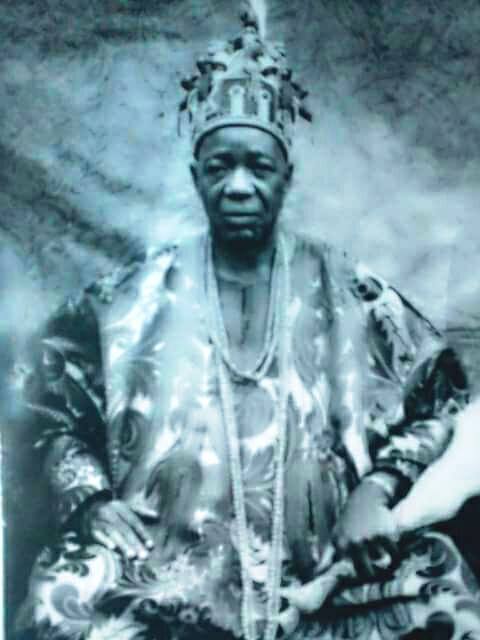Oba Daniel Anirare Aladesanmi II (1902 – 7 January 1983) was one of the most respected Yoruba monarchs of the twentieth century. As the 18th Ewi of Ado-Ekiti, he reigned for an extraordinary 46 years (1937–1983)—a period that witnessed Nigeria’s transformation from British colonial rule to independence and through the country’s early decades as a sovereign nation. His life and reign embodied the delicate balance between preserving Yoruba tradition and embracing modern statehood.
Early Life and Ascension
Born in 1902 into the royal family of Ado-Ekiti (present-day Ekiti State, Nigeria), Daniel Anirare Aladesanmi was groomed in the customs and responsibilities of Yoruba royalty.
Following the death of Oba Adeniyi Ajibade Agunsoye, the throne of the Ewi became vacant. After the traditional selection by Ado-Ekiti’s kingmakers, Daniel Anirare Aladesanmi was chosen and installed on 18 June 1937 as the 18th Ewi of Ado-Ekiti. His coronation took place under the oversight of the British colonial administration, making him the paramount traditional ruler of the Ekiti people at a time when colonial authorities still wielded strong influence over local governance.
Statesmanship in Colonial and Post-Colonial Nigeria
From the outset, Oba Aladesanmi II earned a reputation for diplomacy and political acumen. He became a trusted intermediary between Yoruba traditional institutions and the British government, ensuring that Ekiti interests were heard.
His stature was evident in 1959, when he joined other prominent leaders at the Nigerian Constitutional Independence Conference in London, representing Ekiti and Yoruba traditional rulers as the framework for Nigeria’s 1960 independence was negotiated.
After independence, he continued to play a pivotal role in Nigeria’s evolving political landscape. He served as Deputy President of the Western House of Chiefs, the legislative chamber that united Yoruba traditional rulers to debate regional policy in the old Western Region. In this role, he worked alongside other eminent Yoruba monarchs—such as the Ooni of Ife and the Alaafin of Oyo—helping to shape political discourse and regional development.
Cultural Leadership and Modernization
While he safeguarded Yoruba customs and rituals, Oba Aladesanmi II also championed modernization in Ado-Ekiti:
Education: He supported the establishment and expansion of schools, notably encouraging the growth of Christ’s School, Ado-Ekiti, which became a leading institution in the region.
Infrastructure: He promoted the development of roads, markets, and modern amenities during the Western Region’s mid-20th-century development programmes.
Palace as a Cultural Hub: Under his leadership, the Ewi’s Palace remained a vibrant centre of Yoruba tradition, while also serving as a forum for dialogue between traditional authority and modern government.
Through these initiatives, he preserved the cultural identity of the Ekiti people while guiding them into the modern Nigerian state.
Honours and Recognition
Oba Aladesanmi II’s leadership was recognised both nationally and internationally:
In 1962, during Queen Elizabeth II’s state visit to Nigeria, he was invested as an Officer of the Order of the British Empire (OBE) for his distinguished service and for fostering constructive relations between the colonial government and Yoruba traditional authorities.
In 1978, the Federal Republic of Nigeria awarded him the national honour of Commander of the Federal Republic (CFR), acknowledging his decades of steady leadership and contribution to nation-building.
Death and Legacy
Oba Daniel Anirare Aladesanmi II died on 7 January 1983 at the age of 81, after nearly half a century on the throne. His passing was widely mourned across Ekiti and Yorubaland.
He is remembered not only for his longevity but for his rare ability to bridge the worlds of tradition and modern governance. His reign gave Ado-Ekiti continuity and stability through colonial rule, independence, and Nigeria’s early post-colonial and military eras.
Today, the Ewi’s Palace in Ado-Ekiti remains a living symbol of his legacy—testament to the enduring relevance of Yoruba monarchy in the political and cultural life of modern Nigeria.
Sources
Adebayo, A. G. Ekiti People and Their Neighbours: A History of Inter-Group Relations. Ibadan: University Press, 1993.
FOLLOW US ON:
FACEBOOK
TWITTER
PINTEREST
TIKTOK
YOUTUBE
LINKEDIN
TUMBLR
INSTAGRAM































